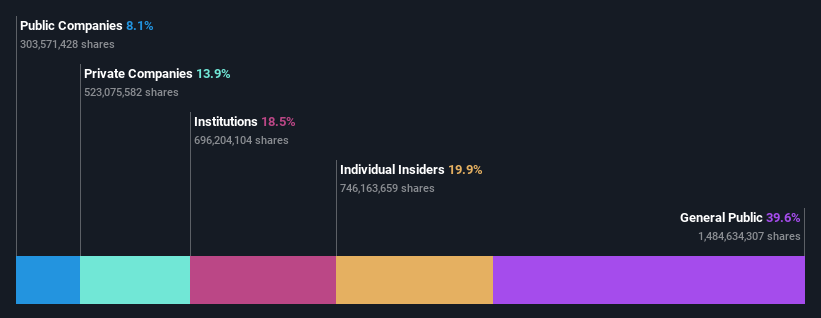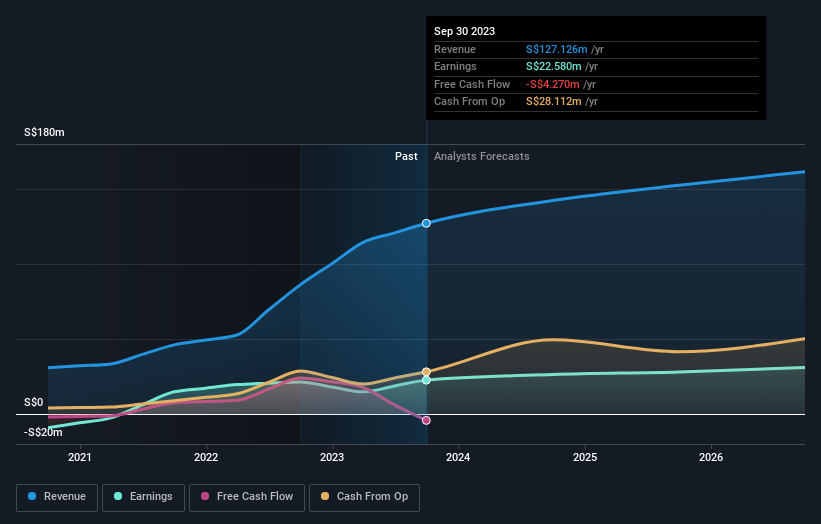While insiders own 20% of Marco Polo Marine Ltd. (SGX:5LY), retail investors are its largest shareholders with 40% ownership
Key Insights
Significant control over Marco Polo Marine by retail investors implies that the general public has more power to influence management and governance-related decisions
54% of the business is held by the top 6 shareholders
Every investor in Marco Polo Marine Ltd. (SGX:5LY) should be aware of the most powerful shareholder groups. We can see that retail investors own the lion's share in the company with 40% ownership. That is, the group stands to benefit the most if the stock rises (or lose the most if there is a downturn).
And individual insiders on the other hand have a 20% ownership in the company. Institutions will often hold stock in bigger companies, and we expect to see insiders owning a noticeable percentage of the smaller ones.
Let's take a closer look to see what the different types of shareholders can tell us about Marco Polo Marine.
View our latest analysis for Marco Polo Marine
What Does The Institutional Ownership Tell Us About Marco Polo Marine?
Many institutions measure their performance against an index that approximates the local market. So they usually pay more attention to companies that are included in major indices.
Marco Polo Marine already has institutions on the share registry. Indeed, they own a respectable stake in the company. This can indicate that the company has a certain degree of credibility in the investment community. However, it is best to be wary of relying on the supposed validation that comes with institutional investors. They too, get it wrong sometimes. If multiple institutions change their view on a stock at the same time, you could see the share price drop fast. It's therefore worth looking at Marco Polo Marine's earnings history below. Of course, the future is what really matters.
Hedge funds don't have many shares in Marco Polo Marine. Apricot Capital Pte. Ltd. is currently the largest shareholder, with 16% of shares outstanding. Nautical International Holdings Ltd. is the second largest shareholder owning 13% of common stock, and Yih Peir Hing holds about 8.1% of the company stock. Yih Peir Hing, who is the third-largest shareholder, also happens to hold the title of Member of the Board of Directors. Additionally, the company's CEO Yun Lee directly holds 4.6% of the total shares outstanding.
On further inspection, we found that more than half the company's shares are owned by the top 6 shareholders, suggesting that the interests of the larger shareholders are balanced out to an extent by the smaller ones.
While studying institutional ownership for a company can add value to your research, it is also a good practice to research analyst recommendations to get a deeper understand of a stock's expected performance. There is some analyst coverage of the stock, but it could still become more well known, with time.
Insider Ownership Of Marco Polo Marine
While the precise definition of an insider can be subjective, almost everyone considers board members to be insiders. The company management answer to the board and the latter should represent the interests of shareholders. Notably, sometimes top-level managers are on the board themselves.
I generally consider insider ownership to be a good thing. However, on some occasions it makes it more difficult for other shareholders to hold the board accountable for decisions.
Our most recent data indicates that insiders own a reasonable proportion of Marco Polo Marine Ltd.. Insiders have a S$40m stake in this S$203m business. It is great to see insiders so invested in the business. It might be worth checking if those insiders have been buying recently.
General Public Ownership
The general public, who are usually individual investors, hold a 40% stake in Marco Polo Marine. While this size of ownership may not be enough to sway a policy decision in their favour, they can still make a collective impact on company policies.
Private Company Ownership
It seems that Private Companies own 14%, of the Marco Polo Marine stock. Private companies may be related parties. Sometimes insiders have an interest in a public company through a holding in a private company, rather than in their own capacity as an individual. While it's hard to draw any broad stroke conclusions, it is worth noting as an area for further research.
Public Company Ownership
We can see that public companies hold 8.1% of the Marco Polo Marine shares on issue. We can't be certain but it is quite possible this is a strategic stake. The businesses may be similar, or work together.
Next Steps:
I find it very interesting to look at who exactly owns a company. But to truly gain insight, we need to consider other information, too. Case in point: We've spotted 1 warning sign for Marco Polo Marine you should be aware of.
Ultimately the future is most important. You can access this free report on analyst forecasts for the company.
NB: Figures in this article are calculated using data from the last twelve months, which refer to the 12-month period ending on the last date of the month the financial statement is dated. This may not be consistent with full year annual report figures.
Have feedback on this article? Concerned about the content? Get in touch with us directly. Alternatively, email editorial-team (at) simplywallst.com.
This article by Simply Wall St is general in nature. We provide commentary based on historical data and analyst forecasts only using an unbiased methodology and our articles are not intended to be financial advice. It does not constitute a recommendation to buy or sell any stock, and does not take account of your objectives, or your financial situation. We aim to bring you long-term focused analysis driven by fundamental data. Note that our analysis may not factor in the latest price-sensitive company announcements or qualitative material. Simply Wall St has no position in any stocks mentioned.

 Yahoo Finance
Yahoo Finance 

